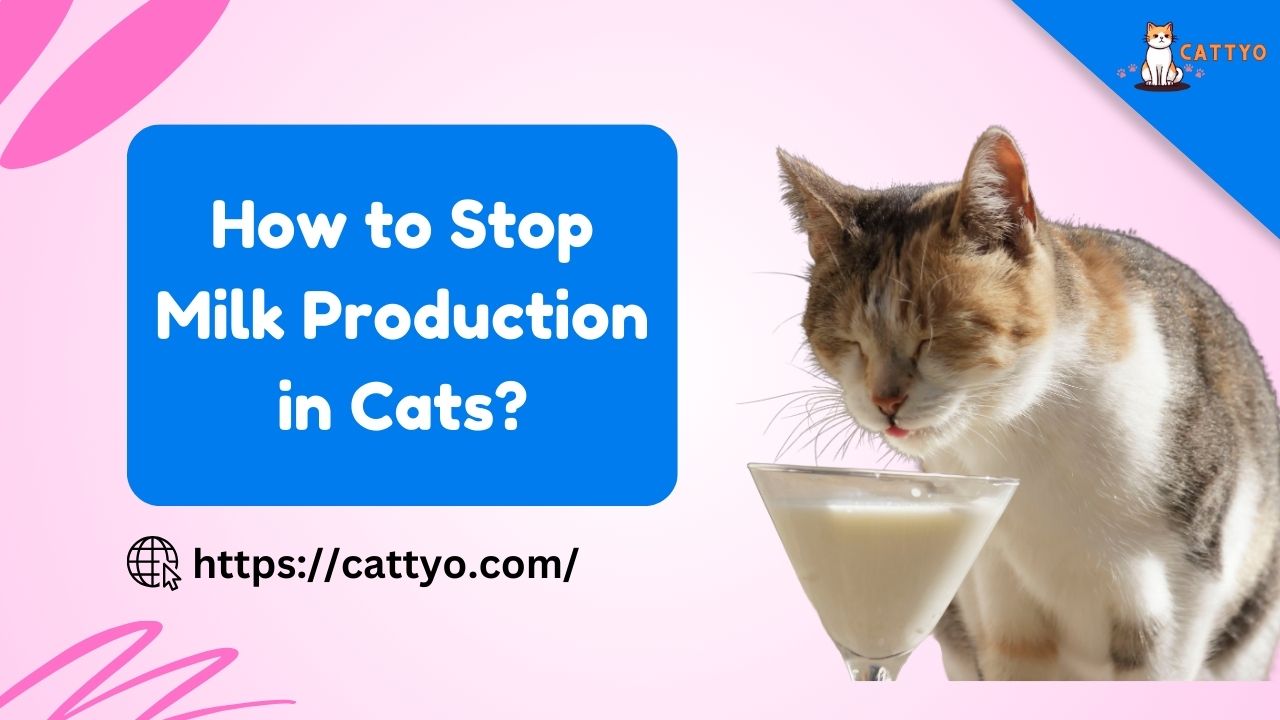To stop milk production in cats, gradually wean the kittens, avoid nipple stimulation, and consult a vet for possible medications like prolactin inhibitors. Proper nutrition also helps manage milk production.
Cats are strange, quirky creatures, aren’t they? From their ability to stare into the void of the night and suddenly start running for no reason, to the fact that some cats actually think they can nurse like kittens.
It’s not that uncommon for female cats—whether they’ve given birth or not—to produce milk. But how do you stop milk production in cats when it becomes an issue? Don’t worry; we’ve got you covered.
How to Stop Milk Production in Cats
To stop milk production in cats, the primary approach is to wean the kittens gradually, as this will reduce the need for the mother to produce milk. It is also important to avoid any physical stimulation of the cat’s nipples, as this can encourage milk production.
In some cases, consulting a veterinarian may be necessary, as they can prescribe medications such as prolactin inhibitors to help stop milk production. Additionally, ensuring that the cat is receiving proper nutrition and care will support the process and help maintain her overall health during this time.
- Gradually wean the kittens from nursing.
- Avoid stimulating the cat’s nipples.
- Consult a vet for medications like prolactin inhibitors.
- Ensure the cat is receiving proper nutrition and care.
So, why is your cat producing milk?
Before we dive into how to stop it, let’s figure out why your cat might be making milk in the first place. It could be that your cat is still going through the hormonal rollercoaster of pregnancy, or perhaps she had a litter in the past and her body just hasn’t gotten the memo that it’s time to stop. There are even non-pregnant cats that can begin lactating due to hormone imbalances or even stress. Yes, cats can get stressed that easily.
But whatever the reason, it’s important to take action. If you’re unsure about the cause, it’s always a good idea to check in with your vet. They can help figure out if there’s an underlying medical condition or if it’s just a weird hormonal quirk of your cat’s body.
How do you stop it?
Here’s the million-dollar question: how do you stop a cat’s milk production? If your cat has been spayed and is still lactating, it might be because her body is a little confused. Here’s how you can help:
1. Weaning her off nursing behavior
If your cat is trying to nurse or engage in nursing-like behavior, like kneading or licking her belly, it’s important to redirect her attention. She might be experiencing hormonal surges or simply acting out of instinct, but in either case, she needs to be gently guided back to more appropriate behaviors.
Pro Tip: Get her some new toys or treats! Interactive toys or puzzle feeders can really help keep her engaged and distracted from her maternal instincts.
2. Reduce stress
Yes, stress can mess with your cat’s body in all sorts of ways—milk production included. If there have been major changes in her environment (a move, a new pet, or even a new person in the house), she could be reacting by lactating. Create a calm, predictable routine to help her feel secure.
3. Medications (under vet supervision)
If the milk production continues or if there’s a clear underlying hormonal imbalance, your vet may recommend medication. The medications usually work by altering the hormonal balance in the body, thereby stopping milk production. But you don’t want to go down this route without professional guidance—please don’t try to self-medicate your cat!
4. Consider spaying (if she’s not already)
If your cat is unspayed, it’s a good idea to get her spayed. Spaying helps eliminate any of the hormonal fluctuations that might cause milk production. It also prevents other health risks and unwanted litters in the future. If she’s already been spayed, the issue could be related to the reasons we mentioned above, like a hormonal imbalance or stress.
5. Time and patience
Sometimes, the best remedy is simply giving it time. If your cat’s milk production is due to a recent pregnancy or a health condition that’s temporary, it may stop on its own after a little while. However, this can be a slow process, and there’s always a chance that the problem may persist.
Is stopping milk production in cats always necessary?
Here’s where things get a little more complex. The need to stop milk production isn’t always urgent. If your cat isn’t showing signs of distress and the milk isn’t affecting her health (or your furniture), it’s probably just a case of nature doing its thing. However, if it’s causing her discomfort or if there’s any underlying health condition, then intervention is definitely called for.
Quick Fixes: A Table for You!
Quick Fixes: A Table for You!” offers a concise and easy-to-read table of solutions for common issues. It provides fast, practical fixes to everyday problems, helping you resolve them efficiently and effectively.
The table is designed to save time and provide clear guidance on addressing various challenges with quick and simple steps.
| Solution | What It Does | When to Use |
|---|---|---|
| Redirect her attention | Keeps her mind off nursing. | If she’s still trying to nurse or knead, and you want to distract her. |
| Reduce stress | Helps balance hormones and reduce lactation. | If stress is the suspected cause of milk production. |
| Medications (Vet) | Corrects hormonal imbalances, halting lactation. | If there’s a persistent issue after trying other methods. |
| Spaying | Eliminates hormonal fluctuations that can cause lactation. | If she’s unspayed or has recently been spayed and still lactating. |
| Give it time | Let nature run its course, especially after pregnancy or lactation. | If there are no underlying health problems and the milk is not a major issue. |
FAQs
Q: Can a non-pregnant cat lactate?
Yes, cats can sometimes lactate even if they haven’t been pregnant. This could be due to hormonal imbalances, stress, or other medical conditions. It’s best to consult your vet to figure out what’s going on.
Q: How long does it take for a cat’s milk production to stop?
It depends. If your cat is lactating due to a pregnancy or recent birth, it might take a few weeks for the milk to stop. If it’s due to a health condition, it could take longer and may require medical intervention.
Q: Should I express the milk from my cat’s nipples?
It’s usually best not to. Unless your vet advises otherwise, expressing the milk can sometimes lead to infections or make the problem worse.
Q: My cat is spayed, but she’s still producing milk. What now?
It’s possible that there’s a hormonal imbalance at play. A vet can prescribe medications or suggest other treatments to help stop the milk production.
In Conclusion: Patience, Care, and the Right Help
Dealing with milk production in cats isn’t always straightforward, but with patience and the right approach, you can help your feline friend. Whether it’s a hormonal imbalance or stress, taking a calm, informed approach is the key.
And remember, when in doubt, consult your vet. They’re the experts who can guide you through this and ensure your cat’s health is on track.





